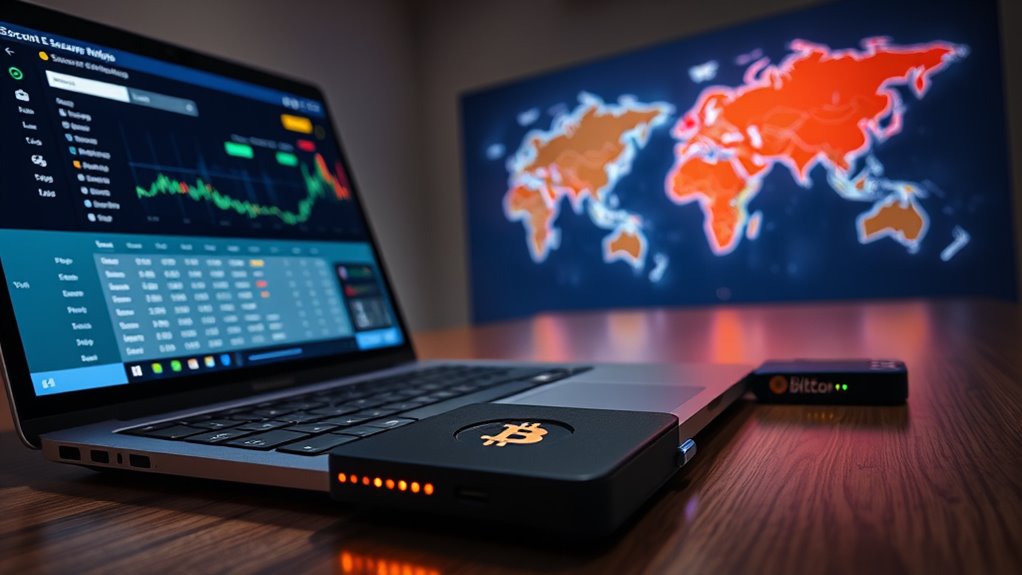To transfer Bitcoin internationally legally and cheaply, you need to comply with regulations like AML and KYC and use regulated platforms that share data according to the FATF Travel Rule. Convert Bitcoin to stablecoins like USDC on low-fee blockchain networks such as Polygon or Binance Smart Chain. Make certain you verify identities and select compliant wallets and exchanges. Staying informed about evolving regulations helps you avoid legal issues. Keep exploring for a full guide on making safe, cost-effective cross-border crypto transfers.
Key Takeaways
- Use regulated exchanges and wallets adhering to AML, KYC, and FATF Travel Rule standards to ensure legal compliance.
- Convert Bitcoin to stablecoins like USDC or USDT on low-fee blockchain networks for cost-effective transfers.
- Verify customer identities thoroughly and share accurate data with VASPs to meet international AML requirements.
- Choose blockchain platforms with low transaction fees and real-time tracking to reduce costs and enhance security.
- Maintain detailed transaction records and stay updated on evolving regulations to ensure ongoing legal compliance.
Understanding Regulatory Requirements for Cross-Border Bitcoin Transfers

Understanding regulatory requirements for cross-border Bitcoin transfers is essential to guarantee legality and avoid penalties. You need to be aware of rules like the FATF Travel Rule, which mandates Virtual Asset Service Providers (VASPs) to collect and share personal data of both sender and recipient. US regulations classify exchanges, wallets, and kiosks as Money Services Businesses (MSBs), requiring anti-money laundering (AML) programs, customer verification, and suspicious activity reporting. Stablecoin issuers face federal oversight under the GENIUS Act, demanding reserve attestations and compliance checks. Different countries have varying AML standards, increasing operational complexity. Ensuring your transfer complies with these regulations helps prevent legal issues, fines, or asset seizures. Staying informed and using compliant platforms makes your international Bitcoin transactions safer and lawful. Additionally, understanding Vetted – Grobal World standards can help you navigate the complex regulatory landscape more effectively.
Choosing Compliant Platforms and Wallets for Legal Transactions

Selecting the right platforms and wallets is essential for guaranteeing your international Bitcoin transfers stay legal and compliant. First, use regulated exchanges and wallets that follow AML, KYC, and the FATF Travel Rule, which require you to verify identities and share transaction data. Choose platforms with transparent policies and strong security measures to protect your assets and data. Avoid unregulated or anonymous wallets that may violate legal standards or attract suspicion. Opt for services that support real-time transaction tracking and reporting, making compliance with cross-border regulations easier. Ascertain both you and your recipients have access to compliant wallets or bank accounts capable of handling cryptocurrency transfers. Staying within regulated platforms helps you avoid penalties, asset seizures, and legal complications. Additionally, understanding the importance of Color Accuracy in projectors can help ensure your visual content remains clear and true to life during presentations or home cinema setups.
Ensuring Customer Verification and Data Sharing to Meet Compliance Standards

To comply with regulations, you need to implement strict identity verification protocols for both sender and receiver. Sharing accurate data with your VASP guarantees transparency and helps meet international AML standards. Making sure this information is verified and properly exchanged is key to legal, smooth Bitcoin transfers. Ensuring compliance standards are met involves continuous monitoring of transaction activities to detect suspicious behavior.
Identity Verification Protocols
Ensuring effective customer verification is crucial for complying with international AML and KYC regulations when using Bitcoin for cross-border transfers. You need reliable identity verification protocols to meet legal standards and prevent fraud. To do this:
- Use compliant exchanges and wallets that implement robust KYC procedures.
- Collect government-issued IDs, proof of address, and biometric data during onboarding.
- Cross-verify customer details through secure, encrypted methods.
- Continuously monitor transactions for suspicious activity and update verification information as needed.
Data Sharing Requirements
Because compliance with international regulations requires transparent data sharing, you must accurately collect and exchange customer information during Bitcoin transactions. This means providing identifying details like names, addresses, and transaction data to VASPs involved in the transfer. The FATF Travel Rule mandates sharing originator and beneficiary data to ensure traceability, preventing money laundering and illicit activity. When using regulated exchanges or wallets, you’re required to submit verified customer information to meet AML standards. Data sharing isn’t just about compliance; it also safeguards your transactions from being flagged or blocked. Be prepared to provide real-time information during transfers, especially across borders. Maintaining thorough records of all data exchanged ensures you can prove legitimacy if regulators review your transactions later. Additionally, understanding zodiac compatibility can provide insights into the trustworthiness and compatibility of your financial partners.
Optimizing Costs With Stablecoins and Efficient Blockchain Solutions

Stablecoins and efficient blockchain solutions are transforming how you can cut costs on international money transfers. By leveraging these tools, you reduce reliance on costly intermediaries and speed up transactions. To optimize costs effectively, consider these strategies:
Harness stablecoins and blockchain tech to cut international transfer costs and boost speed.
- Use stablecoins like USDC or USDT for transfers to avoid volatility and reduce conversion fees.
- Select blockchain networks with low transaction fees, such as Binance Smart Chain or Polygon, to minimize costs.
- Convert Bitcoin to stablecoins before sending to lock in value and streamline settlement times.
- Opt for platforms supporting real-time transaction tracking and compliance, ensuring transparency and avoiding delays.
- Understanding juice detox concepts can help you stay healthy during intensive financial activities by maintaining your energy and focus.
Implementing these steps helps you save money, improve transfer speed, and maintain legal compliance in cross-border transactions.
Managing Risks and Navigating International AML and KYC Laws

When transferring Bitcoin internationally, you need to be aware of varying AML and KYC laws across jurisdictions. Ensuring compliance means verifying identities and following data sharing rules like the FATF Travel Rule. Failing to meet these requirements can lead to legal issues, fines, or asset seizures. Additionally, understanding the AI security vulnerabilities associated with digital transactions can help you better protect your assets and comply with evolving safety standards.
Cross-Border AML Challenges
Navigating cross-border AML and KYC laws presents significant challenges for Bitcoin transfers, as different countries enforce varied regulations that can complicate compliance efforts. You must account for diverse requirements to avoid legal issues.
- Different jurisdictions may demand unique identity verification standards, requiring tailored documentation.
- Some countries impose strict transaction reporting thresholds, affecting transfer limits and record-keeping.
- Varying sanctions and blacklist rules complicate screening processes for cross-border transactions.
- Real-time data sharing and record retention obligations increase operational complexity and costs.
To succeed, you need to stay updated on local laws, use compliant platforms, and implement robust verification and record-keeping practices. This proactive approach minimizes legal risks and ensures smooth, lawful transfers.
Ensuring KYC Compliance
Managing risks in Bitcoin cross-border transfers requires strict adherence to international AML and KYC laws. You must verify both your and your recipient’s identities using compliant platforms that collect and document personal data. This includes providing government-issued IDs, proof of address, and other verification steps mandated by regulations. Using regulated VASPs ensures your transactions follow the Travel Rule, which facilitates transparent data sharing between service providers. Avoid anonymous transfers over certain thresholds, as legal frameworks now enforce mandatory record-keeping. Keep thorough records of all transactions, including hashes and verification details, to prepare for audits or regulatory scrutiny. Implementing email marketing tool integration can help streamline your compliance processes and maintain accurate records. Staying compliant minimizes your risk of fines, asset seizures, or legal trouble while ensuring your international transfers remain lawful and secure.
Staying Ahead: Future Trends and Regulatory Developments in Crypto Transfers

As the crypto transfer landscape evolves, staying ahead of future trends and regulatory developments becomes essential for ensuring legal compliance and competitive advantage. To do this effectively, you should monitor key areas such as:
- Regulatory Harmonization: Expect more countries adopting standardized frameworks like the Travel Rule, making cross-border compliance smoother.
- CBDC Integration: Central bank digital currencies may offer regulated alternatives, influencing how you transfer value internationally.
- Enhanced Transparency: Increased AML and KYC requirements will likely lead to more oversight, requiring better record-keeping and verification.
- Mainstream Adoption: As traditional finance integrates crypto services, staying compliant with evolving regulations will become critical for maintaining access and legitimacy.
Keeping informed on these trends helps you navigate the shifting landscape and leverage opportunities while remaining compliant.
Frequently Asked Questions
What Are the Penalties for Non-Compliance With International Crypto Transfer Laws?
If you don’t comply with international crypto transfer laws, you risk hefty fines, asset seizures, and even losing your license to operate. Authorities may also impose criminal charges, leading to potential jail time. Non-compliance can damage your reputation and restrict future transactions. To avoid these penalties, always make certain you follow AML, KYC, and Travel Rule requirements by using regulated platforms, verifying identities, and maintaining detailed records of your transfers.
How Can I Verify the Legitimacy of a Crypto Transfer Platform?
You can verify a crypto transfer platform’s legitimacy by checking if it complies with regulations like AML and KYC, ensuring it shares transaction data transparently, and verifying its licensing with relevant authorities. Look for reviews, industry reputation, and security features like two-factor authentication. Confirm if they follow the Travel Rule and have transparent fee structures. Avoid platforms with limited information or those operating outside legal jurisdictions to protect your funds.
Are There Legal Limits on the Amount of Bitcoin I Can Transfer Internationally?
You should know that legal limits on Bitcoin transfers vary depending on your country’s regulations. Many jurisdictions don’t impose specific caps but require you to adhere to AML and KYC laws for large transactions. If you transfer above certain thresholds, you might need to provide additional verification or report the transfer to authorities. Always check your local laws and use compliant platforms to guarantee your transfers stay within legal limits.
How Do Different Countries’ Regulations Impact Cross-Border Bitcoin Transactions?
Different countries’ regulations substantially impact your cross-border Bitcoin transactions. Some countries enforce strict AML and KYC laws requiring you to verify identities and share personal data, especially for large transfers. Others may have bans or restrictions on crypto use. You need to use compliant platforms that follow local laws to avoid legal issues. Staying aware of each jurisdiction’s rules ensures your transactions remain legal, secure, and compliant with international standards.
What Security Measures Should I Take During International Crypto Transfers?
You should verify both sender and receiver identities using compliant wallets or exchanges, ensuring adherence to AML and KYC laws. Use secure, reputable platforms that implement encryption and two-factor authentication to protect your accounts. Keep detailed records of all transactions, including hashes and recipient info, for audits. Avoid sharing sensitive data over unsecured networks and stay updated on regulatory changes to prevent legal issues. Prioritize security to safeguard your funds during international transfers.
Conclusion
By following these steps, you’ll find that using Bitcoin for international transfers can be both legal and affordable. When you choose compliant platforms and prioritize security, you naturally stay ahead of regulations. Coincidentally, as more countries embrace crypto, the landscape becomes even friendlier for seamless transfers. So, stay informed and vigilant—your efforts will not only save you money but also keep your transactions smooth and secure in this evolving space.









